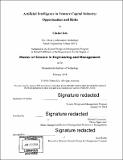| dc.contributor.advisor | Michael Cusumano. | en_US |
| dc.contributor.author | Jain, Chahat | en_US |
| dc.contributor.other | Massachusetts Institute of Technology. Integrated Design and Management Program. | en_US |
| dc.date.accessioned | 2018-10-15T20:24:35Z | |
| dc.date.available | 2018-10-15T20:24:35Z | |
| dc.date.copyright | 2018 | en_US |
| dc.date.issued | 2018 | en_US |
| dc.identifier.uri | http://hdl.handle.net/1721.1/118544 | |
| dc.description | Thesis: S.M. in Engineering and Management, Massachusetts Institute of Technology, System Design and Management Program, 2018. | en_US |
| dc.description | Cataloged from PDF version of thesis. | en_US |
| dc.description | Includes bibliographical references (pages 70-74). | en_US |
| dc.description.abstract | Artificial intelligence - making machines intelligent - is a methodology to build, train, and run machines that are capable of making decisions on its own. Artificial intelligence technologies are gaining significant adoption across a wide range of activities in an organization across different industries. This is fueled by increasing focus on data-driven decision-making methods for all kind of tasks (external or internal) in an organization. Venture capital industry - traditional sub-segment of financial services industry - works heavily on human interactions and relationships. Venture capital investments are considered high-risk, high-return asset class. Venture investment decision-making could be optimized by machine learning applied to previous deals, company data, founder data, and more. It is quite possible that a system could analyze founder personalities, company metrics, and team attributes and improve venture capitalist's decision-making. This thesis is an attempt to analyze and breakdown venture capitalist decisions and understand how Artificial Intelligence tools and techniques could be utilized by VCs to improve decision-making in venture capital. By focusing on the decision-making involved in the following eight value chain areas of a venture capital firm - deal sourcing, deal selection, valuation, deal structure, post-investment value added, exits, internal organization of firms, and external organization of firms, we could discover the extent to which artificial intelligence tools and techniques could be used to improve human decision-making in the venture capital industry. Subsequently, we could also identify how artificial intelligence could be practically used in such decision-making scenarios and also the benefits and associated risks involved in using artificial intelligence system in venture capital decision-making. | en_US |
| dc.description.statementofresponsibility | by Chahat Jain. | en_US |
| dc.format.extent | 80 pages | en_US |
| dc.language.iso | eng | en_US |
| dc.publisher | Massachusetts Institute of Technology | en_US |
| dc.rights | MIT theses are protected by copyright. They may be viewed, downloaded, or printed from this source but further reproduction or distribution in any format is prohibited without written permission. | en_US |
| dc.rights.uri | http://dspace.mit.edu/handle/1721.1/7582 | en_US |
| dc.subject | Engineering and Management Program. | en_US |
| dc.subject | Integrated Design and Management Program. | en_US |
| dc.title | Artificial intelligence in venture capital industry : opportunities and risks | en_US |
| dc.type | Thesis | en_US |
| dc.description.degree | S.M. in Engineering and Management | en_US |
| dc.contributor.department | Massachusetts Institute of Technology. Engineering and Management Program | en_US |
| dc.contributor.department | Massachusetts Institute of Technology. Integrated Design and Management Program. | en_US |
| dc.identifier.oclc | 1055162018 | en_US |
